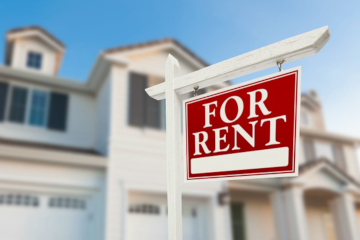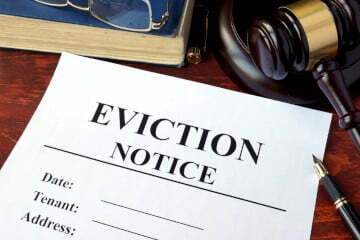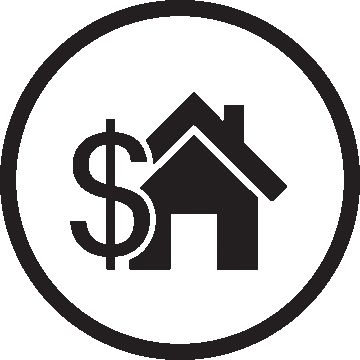I am a big fan of real estate as an investment asset class. That is why I have preached many times about making real estate a cornerstone of your investment portfolio.
There are many benefits to owning rental properties, especially residential.
A few of the benefits are the ability to have leverage, a steady stream of monthly cash flows, and an illiquid market which presents opportunities to pursue a rental property for lower than market price.
Not to mention numerous tax benefits with owning real estate. In fact, one of the tax benefits allowed me the ability to pocket $200,000 in cash while not paying a cent in income tax.
This post isn’t a story of how great real estate can be for you. Rather, it is one which looks at the other side of things.
There are many hidden costs associated with investment real estate ownership. Don’t expect a real estate broker to mention them to you.
Real estate brokers love to advertise a high capitalization rate on a property. There are many expenses which could decrease the advertised cap rate by the broker.
Unsurprisingly, it is in the broker’s best interest to overstate the operating income of the property. This results in a higher cap rate which makes the property more attractive to real estate investors. One way of overstating the operating income of a property is by understating its expenses.
The ability to factor in the additional costs will provide you a better picture of the future cash flows, help level set your expectations and, at the end, result in a better experience with owning property.
You need to know what you will be getting into if you are contemplating getting into the real estate investment game.
Overlooked One-Time Expenses
There are many one-time expenses when buying or selling properties you need to take into consideration.
A few of the house flipping shows overstate the amount of profit generated when they show the net profit as the sale price less the cost of the property. Of course, the purpose of those shows is to show how astute the hosts are in flipping properties. The shows have an incentive to not report the full picture of the transaction costs.
There are a number of transaction expenses you will need to factor in when transacting on a property in order to come up with the gain/loss of the investment:
When buying with financing (i.e. when taking out a mortgage), the below costs can add up to be about 4% of the purchase price and can impact the number when calculating your net income.
Mortgage Points
This is a percentage of the mortgage principal you pay upfront in order to get a better interest rate or to pay a mortgage broker for his service. I try to close a mortgage with zero points. But I’ve paid up to 1 point (1%) of the principal balance of the mortgage when using a mortgage broker.
Closing Costs

Closing costs include mortgage closing costs and legal expenses. Such closing costs associated with closing a property and obtaining the mortgage including attorney fee, payment of the appraisal report for the mortgage, payment of the bank’s attorney, etc.
State/Local Transaction Costs
Different jurisdictions might assess a fee for recording the mortgage or processing the title transfer. In New York, there is a transfer tax paid by the seller, a mortgage recording tax paid by the purchaser, and a mansion tax paid by the purchaser for properties over $1 million.
Title Insurance
This is to protect the buyer in the event if the ownership of the title is ever challenged. In NY, the cost of title insurance is a percentage of the purchase price.
Brokers Fee When Selling
This is a substantial expense with selling a property. In NY, It runs 5% to 6% of total sale price. This cost, along with the state/local transaction costs, makes profiting from house flipping in NY quite hard to do.
Renovation Costs Such As Separating Utilities
Renovation costs can be extensive and expensive. Separating the heating meters and boilers, putting in new hardwood floor, updating the kitchen and bathrooms can quickly add to a large cash outflow.
Other Real Estate Hidden Costs Outside of Closing Costs
Outside of transaction costs, there are hidden expenses for owning a rental property. Owing 6 rental properties, I’ve encountered the hidden expenses below which I would never have even considered prior to owning 18 units over a decade span.
Vacancy

I usually expect my tenants to stay in a unit for 3 years. A period shorter than 3 years would be disappointing to me.
Once a tenant moves out, there is usually preparation work needed to get the unit ready for the next renter. Additionally, you will need to look for a new renter. All this can result in the unit being vacant for a month or more. Vacancy is a cost I factor when looking at the operating income of the property in determining cap rate.
In a popular area for renter, I usually estimate a 3% vacancy rate on annual rent. That comes out to once month of vacancy for every 3 years of tenancy.
Preparation Of Unit For Rental
As mentioned, when a tenant moves out, you might need to prepare the unit for the next tenant.
A new coat of paint might be needed to make the apartment attractive. Maybe updating of the kitchen or bathroom if it has been a while since those areas have been updated.
If your tenants smoked or enjoy frequently cooking food with a strong odor, then you might need to allow the unit to air out which might result in additional time for the unit to be vacant. A professional cleaner might need to be hired to clean up the apartment, the refrigerator, the oven, etc.
Broker Fee\Listing Fee
Unless you have a list of prospective tenants waiting to rent your unit, you will need to find ways to get your unit out in the market place and try to gain as much exposure as possible.
If you don’t have a wait list of prospective tenants, then you can either hire a broker or list your unit online or do both.
To make a listing more attractive to a renter, you might offer to cover the broker’s fee which can be up to 15% of the annual rent in New York. Having a great listing broker can be worth her weight in gold.
I have a listing broker who has helped me rent my units within a few days without resulting in any vacancy on those units.
Less time the unit sits empty the more rent I will collect. This equals more money in my pocket.
Also, renting the unit quickly relieves a lot of stress of dealing with a vacant unit.
The listing agent can also help screen the tenants and provide a background and credit check.
For online exposure, you can go a number of different routes. There is the free route. Another option is to engage paid services or have a combination of both.
A free website I’ve used before is Craigslist. It was very effective a decade ago but, based on my recent experience, a lot less effective now. I’ve also utilized paid website such as Streeteasy in NY to rent our most recent apartment.
Repair
The more units you have the more repairs you will expect to make.
I’ve dealt with roof repairs, bathroom sink leaks, flooding in the basement, boiler repair, repair of stair steps, installation of new windows, putting in new window springs, appliance repairs, and repairing damaged cabinetry because of leaks.
Buying New Appliances
Sometimes when an appliance breaks, it might be more cost effective in the long run to buy a new appliance than to pay for the repair.
You might also want to upgrade an appliance for maximum rent such as moving from a black or white appliance to stainless stain. Refrigerators and ovens are appliances which I have purchased new to replace very old dated ones.
Management Of Property Or Employing A Super
Someone needs to take out the trash, keep the sidewalk free of snow, take out the recycling, and keep the common areas of a building clean.
You can opt to hire a professional management company to help handle the administrative functions including collecting rent and screening tenants. However, professional management companies can charge anywhere from 5% to 10% of gross rent.
In my opinion, that is a huge price to pay for the services, especially if you don’t have a big portfolio of rental properties. Therefore, you might need to engage a mom or pop super or provide a reduced rent to an existing tenant to have the tenant cover all the work needed to keep the property in good order. I usually have a tenant act as the super for a $250 to $350 reduction in monthly rent.
Utilities
The lighting for the public area, the heating for the public area, and water are utilities expenses you need to account for in coming up with total expenses of the rental property.
One Time Expenses Such As Installation Of A New Sewer Pipe
This one is harder to project and anticipate but there are big expenses you need to budget for including roof replacement.
I’ve had to deal with a sewer line replacement connecting my property’s sewer system with the main sewer line of the city. The old sewer line broke. That repair cost me about $15,000 and was not expected.
Needless to say, it was tough getting the news on the $15,000 cost, but worse than the cost was that the sewerage from the building was flooding my basement. Such unexpected expenses can wipe out the operating income of a property for a year or more.
Tax Preparation Fee
A relatively small expense but your cost for tax preparation will go up given the added work the tax accountant needs to do to record the tax income in your tax return.
If you created an LLC to hold the investment property and elected for the LLC to be treated as a tax partnership, there is an additional tax preparation fee for preparing the partnership return for the LLC.
Delinquent Tenants
If you have good tenants, things will go a lot better.
However, sometimes the tenant might be a good tenant up until the period when the tenant decides to move out. I’ve dealt with a tenant who lived in one of my units for 3 years. He was also very friendly and doubled as my super for the building.
Everything was good up to the point of move out and then he purposely decided not to pay the last three months of rental income. The first month of the three months when he didn’t pay, he made up an excuse for the trouble in their financial situation and told me to apply the security deposit towards the rent.
The next month he made more excuses as to why he couldn’t pay the rent and that dragged on for another month. All in all, I lost two months of rental income from the tenant.
This taught me no matter how good the tenant appears to be, you will never know until the tenant is completely out of the unit. Only then can you truly know your net rental income off the tenant.
Eviction of Tenants

I’ve been fortunate enough to not have to go through the eviction process of a tenant for any of my properties. But based on discussions with some other rental property owners, the eviction process can be costly.
In NYC, the attorney fee for hiring an attorney to handle the eviction process runs about $1,500. That is on top of the lost rent when the tenant is occupying the unit until your eviction case goes to trial.
Even after losing an eviction case in court, the tenant can still drag their feet from moving out until you get the marshals involved.
All of this results in dollars out of the pocket, loss rent, and a boatload of headache.
Unpaid Tenant Utility Bill
You have to be mindful when renting a unit out that, if applicable, the tenant needs to reach out to the utility companies to open up accounts in the name of the tenant.
The last thing you want is for the lease to state that the tenant is responsibility for the payment of electricity, gas and heat but the tenant never contacted the utility companies to get the accounts switched over and that the accounts are still under your name or the name of a prior tenant.
That can result in headaches for you to sort out and, potentially, additional money out of pocket.
Extermination Services
I pay, depending on the frequency of service, $120 per month or $150 per quarter, to get one of my buildings serviced by an exterminator. This is to keep the roach and rodent issue under control.
This is another expense people do not usually talk about.
Tickets From The City
My buildings have received tickets from the NYC Department of Sanitation for not separating out the recycling from garbage, disposing of a mattress without the appropriate mattress cover, having an uncleanly sidewalk, and for clearing inspection items late.
In a lot of the cases, I relied on the super to perform a good job to keep the properties from getting a ticket from the city. But surely, once a quarter, I end up having to pay a ticket or two to the city. I do remind the super to be more diligence in caring about the property.

Even with all the hidden expenses, I am still a firm believer in holding real estate. It is my favorite asset class to invest. You just need to have your eyes wide open jumping in and to factor the hidden expenses into your analysis and cash flow projections.
To the audience: Are there any other hidden expenses I have missed? Do you find that the benefits of owning real estate investment properties outweigh the cost? Do you have hints on how to cut down hidden expenses?
Related Posts:
How To Maximize Rent And Other Considerations For A Vacant Rental Unit
10 Ways To Lower Your Monthly Mortgage Payments
Real Estate Should Be The Cornerstone Of Your Investment Portfolio

Many people work hard to better their physical and mental health. What about their financial health?
I started this blog back in 2019 to help people better their financial health as well.
My financial journey began with tens of thousands in student loan debt. Over the span of 20 years, I am close to achieving financial independence.
I truly believe anyone can get to strong financial health. Hopefully, this blog can help you on your financial journey to greater wealth and financial independence.
You can read more about me here.
Thank you for visiting. Come again soon!

That’s a pretty thorough list, Rich. The only extra one I would mention is something that happened to me a few years ago when I bought some land for the first time. Someone super experienced might just call me dumb, but I tried to ask the right questions and got lied to by the seller. It has to do with property taxes CHANGING upon purchase. We purchased acreage in a planned development/community (where they build park areas and walking paths around lakes, etc). I knew we weren’t moving there any time soon (it was planning for the future to be closer to parents). So I asked the seller, who was selling all the lots in the community, how much are taxes. He told me how much HIS company’s taxes were on the lot, but I didn’t know at time, they were receiving a super discounted tax rate (basically for farm acreage until sold). So my cost was supposed to be a $100 or so per year. Well, as soon as we closed, we got the NEW tax bill for normal property in the county, and my $100/year bill switched to $2500/year or so. $200/month extra can kill you if you’re on a bit of a budget. Be careful about getting any kind of fee/tax estimates from sellers.
Right, that’s a good one as a hidden expense that people might not be aware.
Best to have your attorney confirm what the real estate tax is on a property purchase.
A similar situation can help in NYC. The real estate tax being paid by the seller might be abated or reduced because of certain situation with the seller. That reduced real estate tax amount might not be applicable to everyone (for instance, on a condo, you can get a reduced real estate tax rate if you live there but if you don’t, you will have to pay a higher tax rate). Be vigilant in reviewing real estate tax.